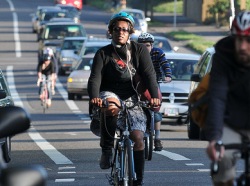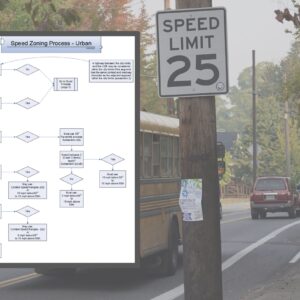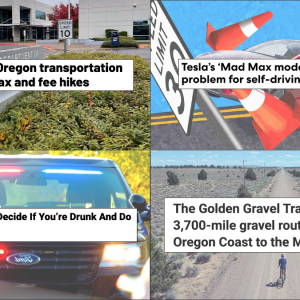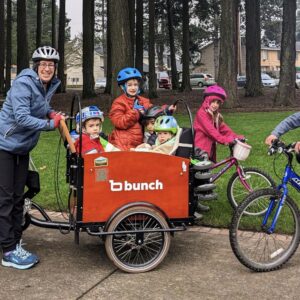
(Photo © J. Maus)
The Lifestyle section of the Washington Post carried a story yesterday titled, Black women take their place in D.C.’s bike lanes. The article touches on the complex intersection of race, gentrification, and bike infrastructure — issues Portland grapples with too.
On North Williams, a project to improve traffic safety and bicycling conditions is on hold while the City attempts to bridge a divide. As a decision to significantly improve the bikeway got closer, some people in the historically black neighborhood stepped up to express that an unfair priority was being given to bicycling and the (mostly white in their minds) people who do it.
Local business owner and Williams resident Sharon Maxwell-Hendricks told me back in April that bicycling is part of the gentrification going on in her neighborhood. “It feels like a small percentage of bicyclists are driving the changes,” she said, “it seems like it’s [bicycling] lately been a part of the whole gentrification and urban yuppie groups and something that’s being more pushed, not because it has momentum and everyone’s like, ‘It’s great! wow, we want to do this!'”
In D.C., the group Black Women Bike is using Facebook to come together and promote bicycling (they’ve got 85 members at last count). Their activism turns the conventional wisdom about race, gender and bicycling on its head.

We have a similar (although less active) group here in Portland. The Sistas Weekend Cyclers was founded in 2008 and has 39 members. The Sistas were founded by Debora Leopold Hutchins, who also happens to be a member of the Stakeholder Advisory Committee for the Williams project.
There’s also the Bicyclists of Color PDX, a Facebook group with 99 members that describes itself as, “a multicultural bicycle club out of Portland Community College. We promote and encourage people of color to saddle up and ride to promote sustainability and healthy living.”
The Washington Post story is sure to be read closely by urban bike planners and City staffers who know that bike projects will have a much better chance of going smoothly if they do not become racially divisive.
Or, as the Washington Post story puts it:
“Those pushing to expand biking infrastructure throughout the city hope that more participation by black cyclists would stem opposition to bike lanes, racks and bike-sharing facilities.”
While Portland is full of advocacy efforts focused on getting more women to ride bikes (as this recent story on PBOT’s Women on Bikes program nicely highlights), I’m not aware of any that are specifically targeted to black women. Perhaps — given the growing awareness of this issue and the trajectory of the Williams project — this will soon change.
If you have a few minutes, I’d highly recommend reading the Washington Post article. I’d also love to hear more from readers about this issue and how you think it might/should play out in Portland.







Thanks for reading.
BikePortland has served this community with independent community journalism since 2005. We rely on subscriptions from readers like you to survive. Your financial support is vital in keeping this valuable resource alive and well.
Please subscribe today to strengthen and expand our work.
My girlfriend is Indian. Does that count? 🙂
how about lets just call them all ‘women’ and leave it at that?
I hear you jeff, but that would be confusing I think. I took cues from the WaPo article. This topic is not easy to write about, so please bear with me. thanks.
-Because the issues that black women face are different than the issues of all ‘women.’
how would you know, ‘dude’?
Mystical Powers, obviously! Or…Maybe he actually pays attention to what black women tell him instead of making the issues of black women invisible by proclaiming “colorblindness?”
Somebody once said that if you don’t see color you don’t see the consequences of color. Since you want to erase the distinction of color and don’t have the first notion why black dude would say that the issues surrounding cycling are different for black women, I’d have to say the saying has already illustrated the way stuff works for the “color-blind.”
Well, to follow your logic, why don’t we just call them all people and leave gender out of it?
Because that would be silly and insulting to suggest that women, or black women, don’t face issues that are unique to them.
It’s beyond wishful thinking to believe that by not recognizing that there are substantial differences in our experiences, we will hasten the solution to those issues.
To do that would require you to ignore about 400 years of history and assume that women, black and otherwise, are on an even playing field.
Black folks, men and women, know this not to be true.
Or they have been conditioned to believe that.
Are we STILL responsible for slavery? Other than throwing my pasty white self on my sword, what more can I do?
If you think this is about slavery, you’re an embarrassment to society.
Jonathan, do you know if Sharon Maxwell-Hendrick’s construction firm offered a bid on the Williams project?
I remember at the open house one of the comments was that the repaving should go to “local minority contractors” and I just realized that she is a contractor.
Certainly is a tough subject, but I really like the group ride idea, especially if it comes from the ground up. I wonder what the BTA or CCC or Bikeportland could do to support one of these groups? Would be cool to have a black people on bikes meet up.
An important issue, indeed.
One of the only disappointments I’ve had moving to Portland from NYC is the lack of diversity. I’ve since learned that the history of prejudice here is deep and still rears its ugly head more than it should.
It’s unclear to me why cycling and racial issues are intertwined, but there’s no denying that the black cyclist is rare. I hope that perception and reality changes soon.
I don’t see a lot of malintent on this issue … I get a sense of historical lingering here. Some folks argue against affirmative action as being reverse discrimination – which might be the case if time “0” started now – but you cannot ignore the past, and the blatantly obvious lack of a level playing field … to this day.
Is there some sort of racist agenda to keep black people off bikes? My bicycle doesn’t see color.
Well said..
I don’t understand this “issue” either. If there is a problem here, it is with their culture. No one is preventing them from riding.
Most white people have never understood the “issue.” Why? because they are white and live in a racist society.
“Bike Me”…
It may not considered an issue in a place like Portland, but in places like DC, Chicago and Philadelphia it is. If half of the population isn’t part of the cycling movement then bicycling will always be marginalized there.
We are convinced that it is cultural, in Philadelphia the bike lane infrastructure is actually skewed towards outer neighborhoods due to wider streets. In Census Tracts where the African American Pop is >75% bike commuters account for 0.36% mode share.
Where it is <50% 2.5%. bike mode share.
I really appreciate this article. It feels like highlighting how people of different backgrounds are getting on bikes is really important, because the goals is for all people to feel welcome in the bike lane, right?
Yes!!
Thanks for posting, Jonathan. For those of you who are bewildered, I have a few things to add:
1. I know that one issue for black WOMEN and cycling is hair and helmets. A lot of black women put lot of time, money, and effort into hairstyles that don’t take well to being crushed.
2. Another issue is that the black community — and, I think, poorer and more oppressed communities as a whole — puts more emphasis on looking good than a lot of Portland whities do. Arriving at work or an event sweaty and disheveled doesn’t necessarily fit with that approach.
3. Giving minority groups permission to be more like you doesn’t count as racial inclusiveness.
I hear you about those issues Kasandra… and they were made very clear to me when I first spoke with Sharon Hendricks. My response is that if we build the type of bikeways we ought to be building, than more people would be compelled to not wear helmets and we could create a type of bikeway environment where people rode more slowly and calmly (like in Copenhagen) and wouldn’t sweat.
The whole, go-fast-and-sweat-and-always-wear-a-helmet thing is a result of cars dominating our streets. When we shift that balance, things will change.
Thank you for pointing out that there are cultural differences that drive different behavior.
For some reason, many white liberals think diversity is everyone acting the same.
The solution to those problems does not fall under something PBOT or any of the “whities” can do. We can’t change the physics of cycling, helmets are probably still a good idea. You still have to excercise to move a bike, and it might make you sweaty.
This is a cultural problem, and it’s not a problem with “whitie” culture.
The “go-fast-and-sweat-and-always-wear-a-helmet” attitude, plus the vehicular cycling movement is what kept me off a bike for years. There’s also the not small issue that as a black woman, my race and gender carry with it certain expectations of what is acceptable behaviour and appearance (hair must be straightened in order to look “professional”, one can’t look like a disheveled bike messenger *ever*, even in your weekend life) that you can willfully remain blind to if it isn’t your reality.
If I’d stayed in Atlanta where I’m originally from, if I hadn’t ever moved to Vancouver, BC, if I hadn’t ever decided to stop chemically treating my hair and grow dreadlocks instead (a lot easier to keep up when you have to deal with sweaty helmet hair), if I hadn’t ever discovered upright, dutch-style bicycles, I probably wouldn’t have ever gotten on a bike.
Thank you for pointing us to the WaPo story, Jonathan, and thank you for giving space here for us to discuss an issue that is very uncomfortable for some people to think about.
Thanks for your comments Cecily and Kassandra! I had not made the connection before that I as a white male it is socially easier for me to be sweaty and/or disheveled out in public than for women and people of color.
Good points. I never consciously thought about how ratty clothes/being disheveled are a white privilidge, but yeah, I can totally see that now.
As Mr. Stites said, one very disturbing thing about Portland is its lack of diversity. That often seems to get swept under the rug (along with the homeless problem, rising number of sex offenders, economic ruin, etc.) Just because some of us can ride bikes in our neighborhoods and recycle and call ourselves “weird”, that doesn’t make everything okay.
Let’s not forget mental illness along the lines of sweeping things under the rug
I will echo the thanks to Kassandra and Cecily for explaining how there continues to be more pressure on some groups/cultures to maintain an especially “proper” or “clean” image. The existence of the pressure makes perfect sense – I just never thought about it.
I always assumed the resistance to bikes as transportation in some cultures was more a function of 1) more machismo in those cultures (in a general, average sense) – more emphasis on fancy cars, fancy jewelry, strength, power, et. al. or 2) the experience of growing up with less wealth (or ancestors with less wealth) and then overcompensating for that experience by being more focused on things, image, not wanting to be seen on a bike, etc. These factors probably exist as well, but it is nice to understand additional factors.
And I agree we should appreciate many of these differences between cultures – they are not necessarily right or wrong, and most often do not necessarily need to be changed. I guess biking is an exception to that – we are trying to change cultures to be more receptive to bikes as transportation. But not any differently than we are trying to encourage ALL people to be more receptive.
I can understand where if you have lived i ht e N Williams neighborhood for your whole life and a bunch of hipsters start moving into your neighborhood and changing things away from what you associate with being your neighborhood, without anybody consulting you if you want these changes, you might be upset.
I understand all that, but don’t buy into it. I see the changes as positive, I believe the neighborhood is cleaner and safer now than 5 or 10 years ago. It still has a ways to go but is so much better now. 10 years ago you didn’t see young women out walking around without some discomfort, your car was much more likely to be broken into, You didn’t even want to bike there because of fear of trouble. Many of the gang houses are gone.
This country is a free enterprise place to do business, this neighborhood does not have the right to say it has to be of a certain culture one way or another.
If someone were to make improvements in bikelanes or anything else then the residents living there should be happy that this came to their neighborhood and not just some exclusive neighborhood across town. They have not been excluded or left out. If they have not been to any of the planning meetings or have not voiced any opinions on how to make changes, then they shouldn’t say they have been left out of the decision process. Perhaps there could have been a better way to inform the residents of the meetings taking place? They can only do so much though.
From where I sit (bike and car) and walk (shoes of a resident, customer, and business owner), this is NOT a bicycle, racial, socioeconomic, or gentrification issue – it’s both a safety and community building issue. In the last 25 years and regardless of race, age, socio-economic status, or gender, the area has NEVER been particularly safe for anyone to bike, cross the street, or emerge from your car on the street side. And the new commercial ventures have yet to figure out how to make many of the longtime residents feel welcome leaving a large residential population out of their customer mix.
So here’s an initiative that proposes to slow traffic down without creating traffic jams, expand the width of the parking lanes, put a buffer between bikes, cars, and pedestrians, improve the crosswalks, and bring more bike traffic and neighborhood accessibility to the still emerging commercial district.
How might that impact the area? Hmmmm…let me count the ways:
1) Slower traffic makes it safer for everyone to cross the street, get out of their cars, ride their bikes, and pay attention to the businesses along the strip.
2) Expanded parking lanes means passengers can emerge from the car without fear of losing life, limb, and/or car door.
3) A buffer between bike and auto lanes means fewer car door-bicycle collisions, safer travel for bicyclists, and puts the bicyclists a bit closer to the storefronts without the distraction of cars and trucks brushing up against them.
4) Better crosswalks mean it’s actually possible to cross the street without holding your breath and saying an extra prayer.
5) More bicycle traffic means more folks that are more likely to pay more attention to more businesses and spend more money and more time as they cruise safely by.
6) More neighborhood engagement with the business district (resulting from being more pedestrian-friendly) promotes more sustainable businesses and opens opportunities for new businesses that cater to specific neighborhood wants and needs to emerge and flourish.
It only speaks gentrification because it’s 20 years overdue, seemingly prompted by the influx of young whites, and is being viewed as just another expensive bicycle transportation initiative in a community that tends to view such projects as yet another way to displace a few more of “them”.I really hope that those perceptions don’t color the reality of a really good if not overdue idea.
I am a woman of color who bike commutes and rides on weekends. As I type, I’m still wearing the clothes that I biked to work in. I’ll be changing soon to into my “work” clothes. I realize that I have a lot of flexibility to do that both in terms of my work and the cultural norms I follow.
On a more serious note, I’d encourage people to look at a report that the Community Cycling Center did on understanding barriers. http://www.communitycyclingcenter.org/index.php/understanding-barriers-to-bicycling/. There’s a lot of good information in the report about the many reasons that people don’t bike.
Jonathan, perhaps it would be a good time to do another article on this topic.
Cheers,
I am heartened by this story and the ways people are creatively connecting that are relevant, fun, safe, and enjoyable. And different. To me that means that we are making progress.
One of the findings from our needs assessment that Jackie references was that more than half the people we spoke with said that riding with a group would remove a barrier to bicycling.
So I say the more the merrier.
A little history folks. “Oregon Territory” was established during the pre American Civil War period when the Abolition movement was big, and at times, violent. When Oregon and Washington split the territory, the white Oregonians decided the simplest way to avoid Abilitionist problems was to outlaw the presence of black people in the territory. Full stop. For what it’s worth, a great many of them were small farmers from New England who had settled int he Willamette Valley. So black people in Oregon (statehood required allowing black people to be citizens) have a very _long_ history of problems from nice, well-meaning, white people.
I think they’re wrong about the Williams bike improvements, but very right to be leery of gentrification. They might just be willing to suffer poor streets if they can still make rent. A bigger problem to address is why there is so much overlap between black people in the U.S. and poverty. A much longer and bitterer history.